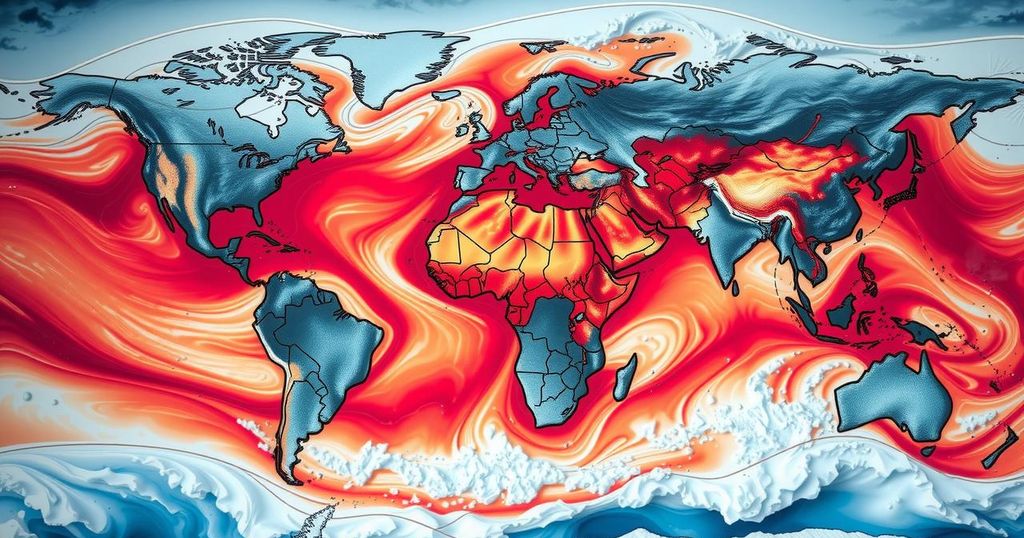In 2024, climate change resulted in an average of 41 extra days of dangerous heat globally, with severe impacts on vulnerable populations and exacerbated weather conditions. Research by scientists revealed that human-induced climate change played a major role in the extreme weather scenarios witnessed throughout the year. Alongside record-breaking temperatures, the year served as a warning about the urgent need to address climate change to prevent future disasters.
In 2024, the world experienced an alarming average increase of 41 additional days of extreme heat, a consequence directly linked to human-induced climate change, according to research conducted by experts from World Weather Attribution and Climate Central. This year was marked by unprecedented high temperatures, establishing 2024 as likely the hottest year on record. Fatal weather events, exacerbated by climate change, affected numerous regions across the globe, leading to severe impacts on the livelihoods and safety of millions of individuals.
The analysis indicates that climate change intensified the frequency and severity of various extreme weather events, including heatwaves, droughts, and heavy rainfall. Friederike Otto, a climate scientist at Imperial College and lead author of the study, stated, “The finding is devastating but utterly unsurprising: Climate change did play a role…and often a major role in most of the events we studied.” Throughout the year, numerous areas, particularly vulnerable regions, witnessed extreme heat conditions, affecting daily life and diminishing public health and safety.
In Northern California, Death Valley, and various regions in Mexico and Central America, soaring temperatures were recorded. Additionally, the excessive heat endangered children in West Africa, and record-high temperatures in Southern Europe forced the closure of cultural sites such as the Acropolis in Greece. The dire situation was compounded by school closures in South and Southeast Asia due to dangerous heat conditions. For their analysis, scientists compared daily global temperatures in 2024 to those expected in a climate-stabilized world, revealing alarming patterns that signaled the urgent need for action against climate change.
Some regions experienced over 150 days of extreme heat attributed to climate change effects. Kristina Dahl, vice president of climate science at Climate Central, emphasized that the poorest nations were disproportionately affected, suffering the most from these extreme conditions. While heat-related fatalities are often underreported, Otto cautioned about the severe public health risks associated with heatwaves and the pressing need for increased awareness and action.
Scientists further noted that this year highlighted the urgent threat of crossing the Paris Agreement’s target of limiting global warming to 1.5 degrees Celsius above pre-industrial levels. A review of 29 significant extreme weather occurrences showed that 26 of these weather events were unequivocally linked to climate change. Although the natural El Niño phenomenon contributed to some weather volatility, researchers confirmed that human-driven climate change was the primary driver of 2024’s devastating weather patterns.
Jennifer Francis from the Woodwell Climate Research Center stated, “Extreme weather will continue to become more frequent, intense, destructive, costly, and deadly, until we can lower the concentration of heat-trapping gases in the atmosphere.” The United Nations has also warned of an escalation in climate extremes as carbon emissions related to fossil fuel combustion reach unprecedented levels. However, Julie Arrighi, from the Red Cross Red Crescent Climate Centre, argued that the impacts of such weather could be mitigated through proactive preparation and adaptation strategies by individual countries.
Overall, the findings from 2024 serve as a crucial reminder of the ongoing climate crisis, underscoring the need for collective global action to curb greenhouse gas emissions and implement preventive measures against the escalating impact of climate change on humanity.
The report on climate change and extreme heat in 2024 highlights the severe impacts of human activities on the planet’s climate system. The increase in dangerous heat days is a consequential outcome of persistent fossil fuel consumption, coupled with greenhouse gas emissions, which have caused global temperatures to rise significantly. The research is integral in understanding the direct links between climate change and severe weather events while calling for strengthened climate policies globally to mitigate further damage. This year stands as a critical juncture for climate action, emphasizing the necessity of adhering to international agreements aimed at preventing catastrophic climate changes.
The data from 2024 reveals an unsettling increase in extreme heat days around the world, a clear indictment of human-induced climate change. Highlighted by the tragic effects on vulnerable populations and the exacerbation of extreme weather conditions, it is evident that urgent action is required to address the escalating crisis. The research underscores the importance of global cooperation in reducing greenhouse gas emissions and preparing for the inevitable impacts of climate change. Immediate and sustained efforts are essential to steer the planet away from the brink of irreversible climate consequences.
Original Source: www.theweek.in






